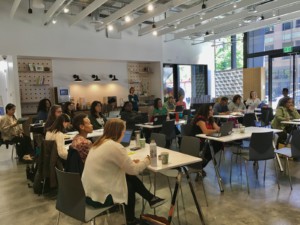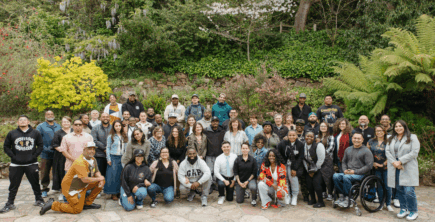
LGBT

On the ground floor of 222 Second Street in San Francisco, local nonprofits can find InCommon: a dedicated space in the LinkedIn San Francisco office for Bay Area-based nonprofits to use at no cost. Tides has partnered with LinkedIn to support this space since May 2019.
Collaborative Spaces Manager Alexis Paza spoke with LinkedIn Community Affairs Manager Orlando White to learn about the challenges of this incredible commitment and why it matters to integrate social impact into your core business model.
Alexis: Where did the idea of InCommon come from?
Orlando: InCommon started as an idea to leverage existing space on the ground floor of our San Francisco office to support organizations that share LinkedIn’s vision of creating economic opportunity for every member of the global workforce.
This is the first space at LinkedIn dedicated to the service of the local community and since our soft launch in March, we’ve supported 20+ mission-aligned organizations, hosted 100+ events and welcomed 500+ community members.
The 1,365-square foot space has the capacity for 40 people, and we have formed a year-long partnership with local nonprofit Creativity Explored to display art within the space. Art is available for purchase through our monthly pop-ups, with 100% of the proceeds going to Creativity Explored and their artists.

Alexis: What is LinkedIn’s larger vision for social impact and why was integrating real estate into your philanthropy so compelling?
Orlando: LinkedIn’s larger vision for Social Impact is a belief in a future where all job seekers have the resources and networks needed to build meaningful careers. InCommon provides a space in our office to manifest that belief through the support of local partner organizations.
Alexis: Tides has been honored to be a part of your work around opening InCommon. How did LinkedIn’s partnership with Tides come about and what has it meant for InCommon and your team?
Orlando: Tides has played an instrumental part in helping us not only launch the space, but also codify our space usage guidelines and partnership strategy. Our partnership formed organically through a connection with a colleague and so much of the impact we’ve had thus far is because of their efforts.
Alexis: What kind of groups are leveraging InCommon so far? Any favorite stories of impact? How have you sought to integrate users’ feedback into the way that the space is managed/leveraged?
Orlando: We are excited to have partnered with a number of partners who have missions to connect underrepresented communities to economic opportunity like Code Tenderloin, Creativity Explored, Jewish Vocational Services (JVS), Year Up, and many others. One of my favorite stories of impact comes from Allyssa, a student through Code Tenderloin, who shared, “I was living in a shelter when I started taking classes with Code Tenderloin. Having a class in a space like LinkedIn motivated me to push harder. Seeing what a day and life could be like for me.”
Alexis: What’s next for your team at LinkedIn and InCommon?
Orlando: We look forward to continuing to support InCommon in San Francisco with additional programming and also expand InCommon to other LinkedIn offices.
//
Interested in starting a collaboration space in your offices? Learn more about Tides Collaborative Workspaces. You can also reach out to Tides to share your specific needs and how we might partner together.

LGBT

Corporate Partners

Philanthropy

Read the stories and hear the voices of social change leaders fighting for justice.